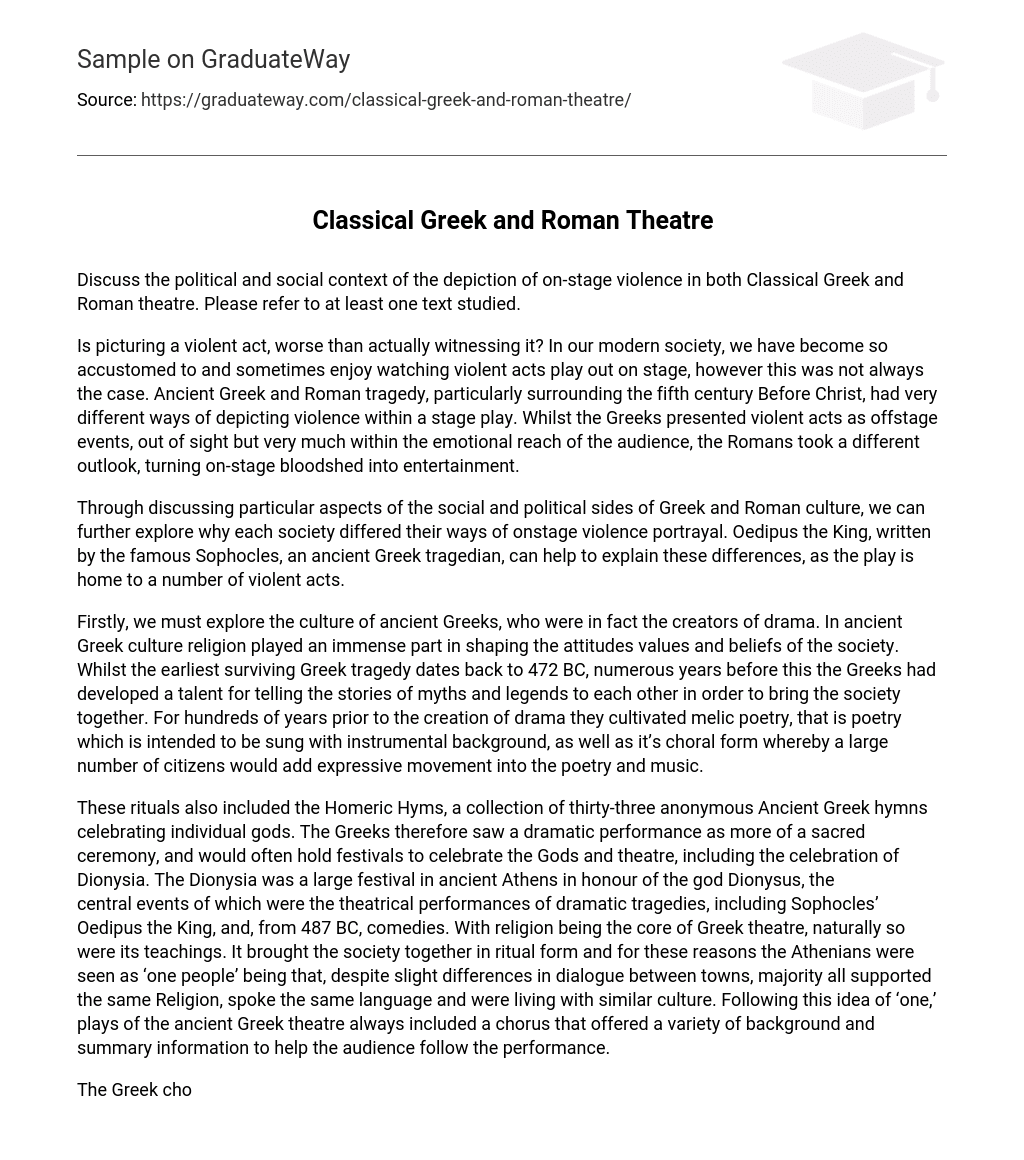Discuss the political and social context of the depiction of on-stage violence in both Classical Greek and Roman theatre. Please refer to at least one text studied.
Is picturing a violent act, worse than actually witnessing it? In our modern society, we have become so accustomed to and sometimes enjoy watching violent acts play out on stage, however this was not always the case. Ancient Greek and Roman tragedy, particularly surrounding the fifth century Before Christ, had very different ways of depicting violence within a stage play. Whilst the Greeks presented violent acts as offstage events, out of sight but very much within the emotional reach of the audience, the Romans took a different outlook, turning on-stage bloodshed into entertainment.
Through discussing particular aspects of the social and political sides of Greek and Roman culture, we can further explore why each society differed their ways of onstage violence portrayal. Oedipus the King, written by the famous Sophocles, an ancient Greek tragedian, can help to explain these differences, as the play is home to a number of violent acts.
Firstly, we must explore the culture of ancient Greeks, who were in fact the creators of drama. In ancient Greek culture religion played an immense part in shaping the attitudes values and beliefs of the society. Whilst the earliest surviving Greek tragedy dates back to 472 BC, numerous years before this the Greeks had developed a talent for telling the stories of myths and legends to each other in order to bring the society together. For hundreds of years prior to the creation of drama they cultivated melic poetry, that is poetry which is intended to be sung with instrumental background, as well as it’s choral form whereby a large number of citizens would add expressive movement into the poetry and music.
These rituals also included the Homeric Hyms, a collection of thirty-three anonymous Ancient Greek hymns celebrating individual gods. The Greeks therefore saw a dramatic performance as more of a sacred ceremony, and would often hold festivals to celebrate the Gods and theatre, including the celebration of Dionysia. The Dionysia was a large festival in ancient Athens in honour of the god Dionysus, the central events of which were the theatrical performances of dramatic tragedies, including Sophocles’ Oedipus the King, and, from 487 BC, comedies. With religion being the core of Greek theatre, naturally so were its teachings. It brought the society together in ritual form and for these reasons the Athenians were seen as ‘one people’ being that, despite slight differences in dialogue between towns, majority all supported the same Religion, spoke the same language and were living with similar culture. Following this idea of ‘one,’ plays of the ancient Greek theatre always included a chorus that offered a variety of background and summary information to help the audience follow the performance.
The Greek chorus comments on themes, and shows how an ideal audience might react to the drama. The chorus also represents, on stage, the general population of the particular story, in sharp contrast with many of the themes of the ancient Greek plays which tended to be about individual heroes, gods, and goddesses. In many of these plays, the chorus expressed to the audience what the main characters could not say, such as their hidden fears or secrets. The chorus often provided other characters with the insight that they needed. Cleverly, the tradgedians used the chorus as a device to explain things which were happening offstage and in our case, violent acts. Due to the respect of the Gods, acts of violence were never portrayed on stage, as the Greeks, you could say, had more class than that. An example of this is seen in the ancient Sophocles Tragedy, Oedipus the King. Nearing the conclusion of events the
‘It had become fashionable to emphaises the social function of Greek theatre in fifth century especially tragedy and performance at Dyonisia -The celebration of divinity whether at a festival or not, was often a group activity. -Religion in Greek society helped to develop tragedy. (teaching moral lessons, honouring the Gods, competitive creativity) – chorus, voice of the people, greater conscience.
– Dionysis cam to be regarded as the patron of dramatic poetry -Greek theatre born of religion and Artisry. The core of Greek theatre was religion.
Why did the Greeks perform stage plays mainly religious reasons – All Greeks were ‘one people’ They had same religion same basic culture and same
language, and were bary aware of tribal origins -Society placed considerable emphasis on literature
-Greeks built the foundations of what we see as theatre today. Starting with the playwright Aeschylus, who coined the idea of dialogue and interacting characters, theoretically creating drama. Sophocles created irony as a literary technique -Ancient Greek theatre flourished between 550BC and 220BC
-Religion in Greek society
– taught moral lessons
Dionysis and religion
– to relax and enjoy performance
-linked theatre to religion whereas romans didn’t
-chorus, voice of the people, greater conscience.
-Greek theatre born of religion and Artisry. The core of Greek theatre was religion.
Paragraph 2: POLITICAL GREEK
– Slavery
-political law on violence
– outlook on women
– theatre was meant to be controversial
-Decline of the greek government Athens became a democracy
Paragraph 3 : SOCIAL ROMAN
– Slavery
– outlook on women
– theatre was more a reflection of roman culture and habits. – people wanted entertainment
– Romans heavily influenced by Greek tradition
– Roman theatre well known for decadence and debauchery
– Roman public loved a good spectacle, loved to watch combat -Gladiator fights
– People liked realism
– Bloodshed through entertainment and violence
– Sport
– class distinction
– Drama was dissociated from the worship of Dionysis/Religion
Paragraph 4: POLITICAL ROMAN
– Roman emperors and entertainment
– Legal public executions and brothels
– Republic
-Caesar and Nero
CONCLUSION





